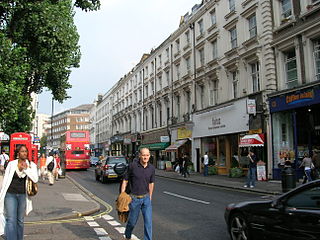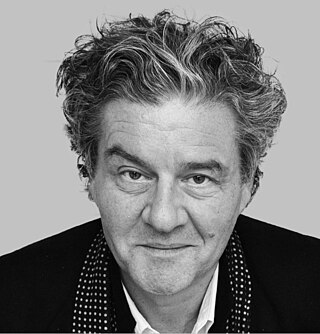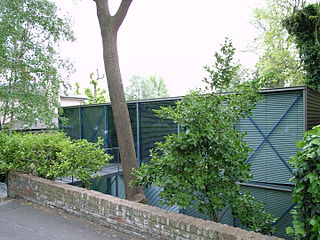Related Research Articles

Skidmore, Owings & Merrill LLP (SOM) is an American architectural, urban planning and engineering firm. It was founded in 1936 by Louis Skidmore and Nathaniel Owings in Chicago. In 1939, they were joined by engineer John Merrill. The firm opened its second office, in New York City, in 1937 and has since expanded, with additional offices in San Francisco, Los Angeles, Washington, D.C., London, Melbourne, Hong Kong, Shanghai, Seattle, and Dubai.

Notting Hill is a district of West London, England, in the Royal Borough of Kensington and Chelsea. Notting Hill is known for being a cosmopolitan and multicultural neighbourhood, hosting the annual Notting Hill Carnival and the Portobello Road Market. From around 1870, Notting Hill had an association with artists.

Paddington is an area in the City of Westminster, in central London, England. A medieval parish then a metropolitan borough, it was integrated with Westminster and Greater London in 1965. Paddington station, designed by the engineer Isambard Kingdom Brunel opened in 1847. It is also the site of St Mary's Hospital and the former Paddington Green Police Station.

The Westway is a 2.5-mile (4 km) elevated dual carriageway section of the A40 trunk road in West London running from Paddington in the east to North Kensington in the west. It connects the London Inner Ring Road to the West London suburbs.
The year 1976 in architecture involved some significant architectural events and new buildings.

White City Place is the name given to the collection of buildings formerly known as BBC Media Village. White City Place is a collection of six buildings occupying a 17-acre site off Wood Lane, White City in West London, bordered by South Africa Road, Dorando Close and the A40 Westway. The site is a short distance along Wood Lane from BBC Television Centre. All formerly properties of the BBC, only two buildings – Broadcast Centre and the Lighthouse – are currently occupied by BBC staff.

Westbourne Grove is a retail road running across Notting Hill, an area of west London. Its western end is in the Royal Borough of Kensington and Chelsea and its eastern end is in the City of Westminster; it runs from Kensington Park Road in the west to Queensway in the east, crossing over Portobello Road. It contains a mixture of independent and chain retailers, and has been termed both "fashionable" and "up-and-coming".

Westbourne is an area in West London. It has a manorial history spanning many centuries, within a more broadly defined Paddington, before shedding its association in the mid-19th century. It is named after the west bourne, West Bourne, or River Westbourne, a Thames tributary which was encased in 19th-century London in the 1850s. The spring-fed stream and associated manor have led to the place names Westbourne Green, Westbourne Park and more narrowly: Westbourne Gardens, Westbourne Grove, Westbourne Park Road, Westbourne Park tube station, Westbourne Studios and the name of a public house.

The A40 is a major trunk road connecting London to Fishguard, Wales. The A40 in London starts in the City of London and passes through six London Boroughs: Camden, Westminster, Kensington & Chelsea, Hammersmith & Fulham, Ealing and Hillingdon, to meet the M40 motorway junction 1 at Denham, Buckinghamshire.
Jay Jay Burridge also known as Jay Burridge is an artist and former television presenter. He fronted the BBC children's art programme SMart from 1994 until 2003, when he left and became a graphic designer and snowboard inventor. He was a close friend of colleague Mark Speight.
Pringle Richards Sharratt is an architectural firm that was formed in 1996 by John Pringle, Penny Richards and Ian Sharratt. Based in London, the practice has worked on public buildings, art galleries, museums, libraries, archives, university and transport buildings. Before forming PRS, John Pringle and Ian Sharratt were partners at Michael Hopkins and Partners and Penny Richards had her own practice that specialised in museum and gallery projects.

George Henry Walton, was a noted Scottish architect and designer of remarkable diversity.

Feilden Clegg Bradley Studios is a British architectural design firm, established in 1978, with offices in Bath, London, Manchester and Belfast. The firm is known for its pioneering work in sustainable design and social design agenda.
Urban Eye is a London-based charity that has been regenerating run-down parts of inner city London through the use of design, architectural lighting and public art since 1998. Projects aim to reduce fear of crime and anti-social behaviour and to create a more positive identity for urban zones for the benefit of both residents and visitors alike. Where possible, projects involve local people directly in the creative process, including partnerships with schools, resident groups youth projects and disability authorities.

Charles William George Hadcock is a British sculptor known for his monumental sculptures that incorporate elements of geology, engineering, and mathematics. Hadcock's work also draws inspiration from music, philosophy, and poetry. He is a Deputy Lieutenant of Lancashire.

Michel Mossessian is a French architect of Armenian origin, based in London, UK.
Sophie Hicks is a British architect and former fashion editor.

The Hopkins House at 49a Downshire Hill is the common name given to the high-tech home and workspace in Hampstead, London (1976), designed by architects Michael and Patty Hopkins. It has been described as a "genuine icon of the High Tech movement". The house won a RIBA Award for Architecture in 1977 and a Civic Trust Award in 1979.

St John's is a proposed £1 bn development of a 6 hectare plot within central Manchester, England. The site is being developed by Manchester Quays Ltd (MQL), a partnership between Manchester City Council and Allied London.

Lansdowne Studios was a music recording studio in Holland Park, London, England, which operated between 1958 and 2006.
References
- 1 2 Glancey, Jonathan (26 August 2002). "A road runs through it". The Guardian . Guardian Media Group . Retrieved 17 October 2007.
- ↑ Merrick, Jay (9 January 2002). "Arts: Wasteland revisited ; It's an unpromising site, but London's Westway flyover has become host to a remarkable new development of studios designed by Graham Clark formerly of Langley Clark Architects. Will this, asks JAY MERRICK, pave the way for greater innovation in urban renewal?". The Independent . Independent News & Media. pp. 12–13. Archived from the original on 17 December 2001. Retrieved 18 October 2007. Alt URL
- ↑ Worsley, Kate (6 October 2002). "Living Review Design: We can make it ; Fancy starting your own creative business? Don't want to run it from the spare bedroom? You are not alone. Kate Worsley visits the state- of-the-art Westbourne Studios, where an army of designers and artists are discovering that 'work can be play'". The Independent on Sunday . Independent News & Media. pp. 42–4. Archived from the original on 2 October 2002. Retrieved 18 October 2007. Alt URL